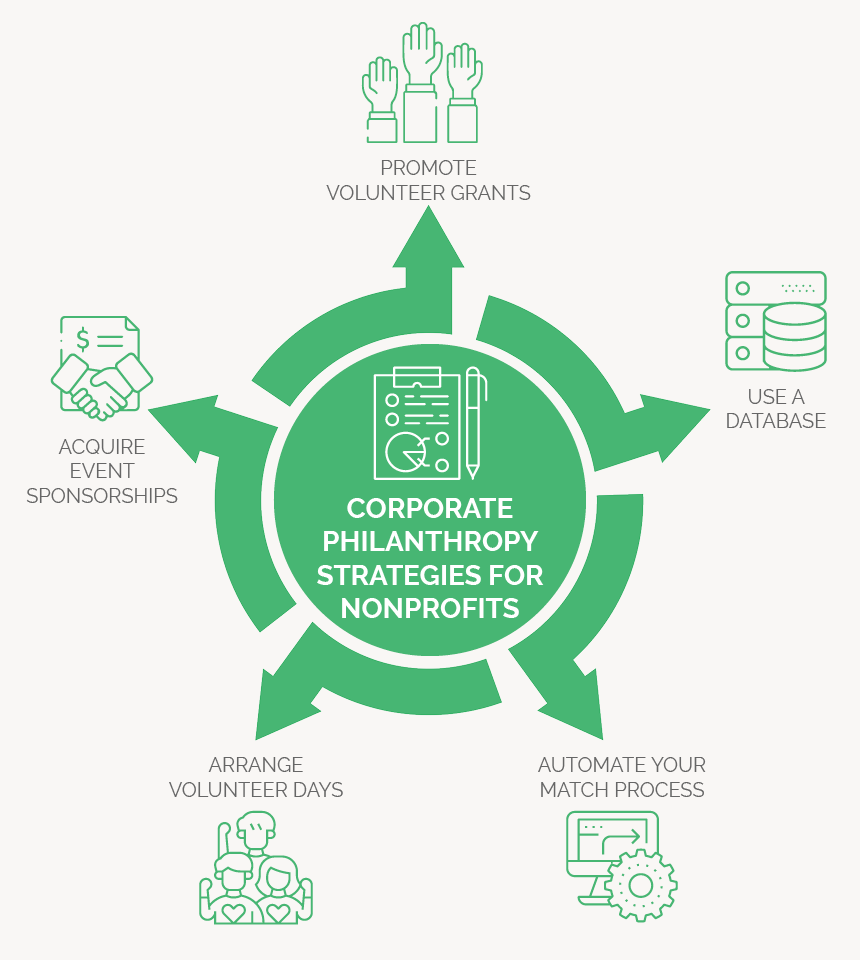Can corporate philanthropy solve America’s infrastructure crisis?
Wiki Article
The Role of Corporate Philanthropy in Fostering Sustainable Company Practices
Business philanthropy has become a crucial approach for companies intending to integrate sustainability into their procedures. By lining up corporate objectives with social and environmental efforts, companies can cultivate healthier environments. This strategy not just improves business track record but also strengthens stakeholder connections. The real degree of its impact on long-lasting service success continues to be to be discovered. What ingenious practices are being embraced therefore?Understanding Business Philanthropy and Its Importance
Business philanthropy offers as an essential system where companies can add to societal well-being while boosting their own credibilities. This technique includes organizations alloting resources, such as funds, time, or knowledge, to sustain neighborhood initiatives, philanthropic causes, or social programs. By taking part in philanthropic initiatives, companies can attend to pressing social problems, such as education, health and wellness care, and environmental problems, thus playing a crucial function in cultivating positive modification.Corporate philanthropy can enhance staff member morale and bring in ability, as individuals increasingly look for to function for socially liable companies. It can also reinforce customer loyalty, as consumers favor brand names that demonstrate a commitment to making a difference. Eventually, recognizing the importance of corporate philanthropy lies in identifying its twin advantages: enriching community welfare while at the same time improving organization reliability and dependability in the eyes of stakeholders. This positioning of social duty with business rate of interests emphasizes its value in today's company landscape.
The Link In Between Corporate Philanthropy and Sustainability
While lots of business involve in philanthropy to enhance their public image, a deeper link exists in between company philanthropy and sustainability. Company philanthropy frequently lines up with lasting practices by sustaining initiatives that attend to social and ecological challenges. When services spend in area projects, sustainable energy, or curricula, they add to a much healthier environment and society. This dedication not only cultivates a good reputation however also enhances stakeholder connections, enhancing brand commitment.
Case Studies: Successful Corporate Philanthropy Initiatives
Numerous business have actually successfully incorporated humanitarian efforts right into their company approaches, showing the concrete benefits of such commitments. For example, Microsoft has launched various programs, such as its AI for Earth initiative, which supports environmental sustainability via innovation. This technique not only aids preservation initiatives but also enhances Microsoft's track record as a leader in company responsibility.Likewise, Unilever's Sustainable Living Plan stresses social and ecological influence, straightening its philanthropy with company purposes. By moneying jobs that boost hygiene and sanitation, Unilever enhances its brand while adding to international wellness.
One more noteworthy instance is Patagonia, which vows 1% of sales to environmental reasons. This commitment reverberates with customers, promoting commitment and driving sales.
These situation studies highlight that efficient company philanthropy can produce financial returns while promoting sustainable methods, strengthening the idea that ethical business techniques are useful for both culture and bottom lines.
Structure Stronger Stakeholder Relationships Via Philanthropy
Philanthropy acts as a crucial device for firms seeking to reinforce their relationships with stakeholders, as it promotes depend on and shows a dedication to social responsibility. By participating in charitable campaigns, businesses can connect with regional communities, enhancing their credibility and This Site encouraging stakeholder loyalty. This engagement often results in purposeful communications, developing a feeling of common values in between the firm and its stakeholders.Additionally, humanitarian initiatives can resolve specific community needs, enabling companies to contribute favorably to social challenges. This involvement not only showcases a firm's moral stance but additionally helps in bring in and keeping customers that focus on social obligation.
In addition, workers often really feel more determined and involved when they see their organization actively joining philanthropic activities, resulting in a much more productive workplace culture. Corporate philanthropy comes to be a strategic avenue for constructing stronger, more durable relationships with varied stakeholder groups.
Measuring the Impact of Business Philanthropy on Company Success
The link in between business philanthropy and stakeholder engagement establishes the phase for reviewing its effect on overall organization success. Organizations usually measure this effect via different metrics, consisting of brand name online reputation, employee contentment, and customer loyalty. Philanthropic efforts can enhance a company's picture, cultivating trust fund among financiers and customers alike. Engaged employees tend to exhibit greater spirits and performance, directly correlating to improved service efficiency.
Measurable evaluation can likewise be employed, with companies reviewing monetary returns versus philanthropic expenditures. Study shows that business with solid humanitarian dedications frequently experience greater stock performance and lowered volatility. In addition, qualitative assessments, such as stakeholder responses, can offer understandings right into area assumptions and long-term relational advantages.
Inevitably, gauging the impact of corporate philanthropy calls see this site for a complex technique, integrating both quantitative and qualitative data to ensure a comprehensive understanding of its influence on organization success. corporate philanthropy.
Frequently Asked Concerns
Just How Can Small Companies Participate In Company Philanthropy Properly?

What Are Typical False Impressions About Corporate Philanthropy?

Exactly How Does Business Philanthropy Influence Staff Member Spirits?
Corporate philanthropy positively influences staff member spirits by promoting a feeling of purpose, boosting job fulfillment, and advertising loyalty. Staff members usually really feel a lot more involved and inspired when their firm contributes to social causes, producing a helpful workplace.What Are the Tax Advantages of Corporate Philanthropy for Services?
Company philanthropy provides substantial tax benefits for services, consisting of reductions on philanthropic payments and possible decreases in taxable revenue. These rewards encourage firms to participate in social campaigns while all at once improving their financial standing.Just How Can Business Pick Reliable Philanthropic Allies?
Firms can select reliable philanthropic companions by reviewing placement with their worths, determining influence capacity, taking a look at financial openness, and cultivating strong interaction. This strategic technique improves cooperation and guarantees mutual benefits for both celebrations included.Business philanthropy serves as a necessary device via which organizations can contribute to societal health while improving their very own credibilities - corporate philanthropy. Eventually, recognizing the relevance of business philanthropy lies in acknowledging its dual advantages: enriching area well-being while at the same time improving business reputation and reliability in the eyes of stakeholders. While several companies involve in philanthropy to improve their public photo, a much deeper connection exists between corporate philanthropy and sustainability. The link between company philanthropy and stakeholder engagement establishes the stage for assessing its effect on total service success. More Bonuses Corporate philanthropy provides considerable tax advantages for companies, consisting of deductions on philanthropic contributions and prospective reductions in taxed income
Report this wiki page